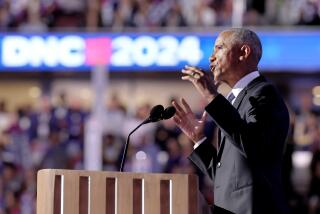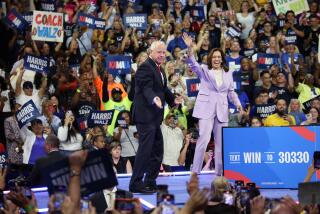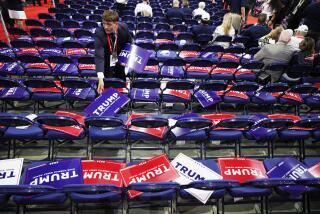For The Sake of Argument : Dukakis Is Debating at Low Tide
- Share via
Tonight’s nationally televised debate with Vice President George Bush offers Michael S. Dukakis a pivotal opportunity to sharpen a campaign appeal that still hasn’t snapped into focus.
Since the GOP convention in August, Bush has dominated the campaign by making it a referendum on ideology and values. Day after day he has pummeled Dukakis as an unreconstructed liberal, soft on crime and defense and suspect in his patriotism. By forcing the race through that polarizing ideological prism, Bush erased Dukakis’ double-digit lead.
Dukakis’ aides tried instead to establish a non-ideological comparison: Dukakis as the candidate of forward-looking change against Bush, smug champion of the past.
Events, and Dukakis’ own failures, have set that strategy awry. Earlier this year, the case for change seemed irresistible. During the primaries, the Democrats focused attention on an oozing array of Administration scandals--Atty. Gen. Edwin Meese III’s legal troubles, the negotiations with Panamanian dictator Manuel A. Noriega, the Iran-Contra indictments.
Each reinforced a vague uneasiness about the nation’s economic future that corroded voters’ confidence. Polls showed that--despite reductions in inflation and unemployment--a majority of Americans believed the country was on the “wrong track.” Bad news for Bush.
But the situation has changed dramatically. Meese is gone, Iran-Contra trials won’t begin until next year and the Noriega conflict is a stalemate. Dukakis resembles a man on the beach at low tide, watching his best issues inexorably recede.
Just as important, Bush effectively used the GOP convention to remind voters that the Administration has made significant economic progress since the Carter years. Millions of dollars in advertising funded by the Republican National Committee reinforced the message.
Now, for the first time since 1986, more Americans are optimistic than pessimistic about the country’s direction, according to a recent survey by Richard B. Wirthlin, Reagan’s pollster. As voters have grown increasingly satisfied with the nation’s trajectory, Reagan’s approval rating has moved up--and so has Bush. William McInturff, a senior research associate at the Wirthlin Group, sees the optimistic trend continuing through Election Day.
Even so, the underlying mood isn’t comparable to 1984, when economic recovery, the Los Angeles Olympics and Reagan’s “Morning Again in America” ads inspired a national wave of celebration that swept the President to a crashing victory. By October, 1984, roughly two-thirds of the public felt the United States was moving in the right direction; against that tide Walter F. Mondale had no more chance than a sailboat against Hurricane Gilbert. Today, the mood is equivocal. In the latest Wirthlin poll, 47% say the country is on the wrong track--compared with 49% holding a positive view. Those numbers partly reflect the voters’ natural itch for something new after eight years.
But if this doesn’t recall Reagan’s 1984 triumph, neither does it resemble 1980, when unhappiness with the nation’s direction virtually guaranteed defeat for incumbent Jimmy Carter. The urge for change in 1988 has never been as strong as many Democrats believed. In periods of discontent, like 1980, more than two-thirds of the public considers the country off-track; dissatisfaction was never that widespread in 1988. This year’s numbers, McInturff and others say, augur a close race where regional differences and tactical decisions will have great impact.
Since the Democratic convention, Dukakis has been somewhat less than Napoleonic in his maneuvers. His campaign has never adapted to this changing environment. Since announcing his candidacy last year, Dukakis has taken the desire for change as a given--and spent much time reassuring voters that he won’t go overboard. His new initiatives have been notable for their modesty: He promised only $500 million for his vaunted Fund to Rebuild America, hardly enough to rebuild a single decaying bridge.
In a crowded Democratic field where he had major financial advantages, that upbeat, incrementalist appeal let Dukakis emerge as the least objectionable alternative. But his torpid performance since the Democratic Convention has revealed the inadequacy of that approach against an evenly matched opponent. “The candidate wants to dance with the girl that brung him and he doesn’t understand that this girl isn’t invited to the dance anymore,” said a top Democratic strategist.
Dukakis’ minimalist strategy has two major drawbacks. One is he hasn’t set a high standard of change for Bush to reach. Within a framework of overall continuity, Bush has deftly promised to move away from Reagan policies on the environment, education and such social needs as day care. The other drawback is that it does nothing to inflame the desire for change, unlike the more jagged anti-corporate economic nationalism messages used by primary opponents Jesse Jackson and Rep. Richard A. Gephardt (D-Mo.).
More than stubbornness restrains Dukakis; he has reasons to be cautious. If he’s too positive, he offers voters no basis for rejecting the status quo and Bush. But if he’s too negative, he undermines his credibility--and lends credence to the GOP charge that he would threaten Reagan’s successes. Only about 40% of the electorate--roughly the core Democratic vote--wants the next President to break with Reagan’s policies, according to Wirthlin surveys. The decisive 40% of voters in the middle want modest change.
Within those constraints, can Dukakis construct a case for changing the hand on the tiller? Democratic strategists see two alternatives: going-with-the-flow or challenging complacency. Not surprisingly, Dukakis is now trying both.
The going-with-the-flow option is the political equivalent of hitting to the opposite field against a fastball pitcher. Proponents of that strategy say Dukakis should assume that people are satisfied with the way things are going, but argue that he, not Bush, has the personal strength to keep the nation on an even keel. That idea was reflected in a mid-September speech, when Dukakis suggested he was better suited to follow up Reagan’s arms-control breakthroughs than Bush, and in Dukakis’ recent warning about “four more years of Reaganomics without Reagan.”
But Dukakis has squandered his lead on most measures of personal strength through his hesitant responses to Bush’s attacks over the past two months. Unless he can suddenly turn those numbers around, he can’t depend on personal comparisons to give him the election.
More promising may be the bolder strategy of directly challenging complacency. In the last two weeks, Dukakis has tried to refocus attention on the doubts about America’s long-term economic future. His ambitious health plan announced last week spoke to voter concerns that significant social needs remain unaddressed by the Administration. “There are still important anxieties about the economy and family and America’s position in the world,” said Democratic pollster Stanley B. Greenberg, who has examined these issues more fully than other strategists.
Bush, in his acceptance speech, dismissed those concerns when he declared “America is not in decline. America is a rising nation.” That was a bold, even inspirational thrust--but not responsive to the voters’ fears.
With such a sweeping pronouncement, Bush placed himself on a limb that Dukakis may be able to saw off. He’s trying. Last week in Arkansas, Dukakis railed against “statistics that glide over the anxieties and the uncertainty that many Americans feel when they think about the future”; and he warned “unless we take charge of the future” and reclaim control of our economy from “foreign companies and foreign governments,” living standards may decline.
Those kinds of bristling words have never come out of Dukakis’ mouth easily. It’s risky to make the case for change in a nation settling into complacency as Election Day nears. But Dukakis’ fall in the polls and generally poor performances since the Democratic Convention prove caution has its risks, too.
More to Read
Get the L.A. Times Politics newsletter
Deeply reported insights into legislation, politics and policy from Sacramento, Washington and beyond. In your inbox three times per week.
You may occasionally receive promotional content from the Los Angeles Times.










